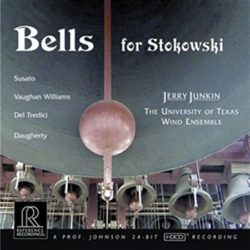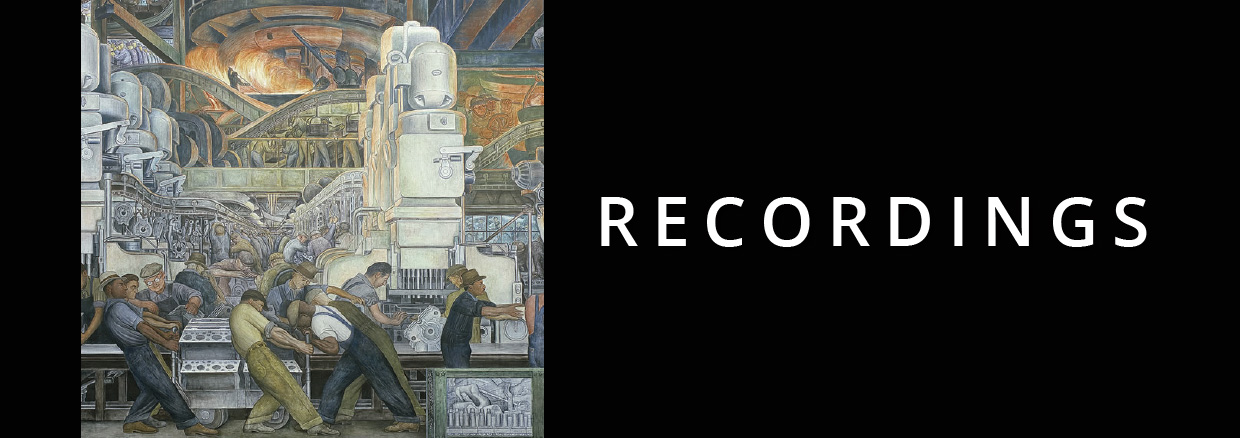Bells for Stokowski
Reference Recordings/January 2004
University of Texas Wind Ensemble
Jerry Junkin, conductor

REVIEW FROM CLASSICS TODAY, JANUARY 11, 2006:
The disc title promises sonority, sonority, sonority. The 24-bit HDCD stereo recording begins with timpani, then more drums, then other percussion, then brass, all roaring and pounding out the start of a brilliant arrangement by Patrick Dunnigan of selections from Susato’s The Danserye. The sound is just as real as it can be, utterly without strain or congestion, the contrabassoons buzzing, the horns barking, the trombones and trumpets crackling. I’m a fan for SACD surround, but this sounds cleaner, more natural, and even more spatially defined than at least 85 percent of the discs I’ve heard in the newer format.
Jerry Junkin and the University of Texas Wind Ensemble are first rate throughout. Their alert, lively performances have the electricity of a Texas line storm, but also are notable for their precise tuning and excellent ensemble. In Ralph Vaughan Williams’ English Folk Song Suite they are in no way inferior to the classic Fennell recording on Telarc. Two premieres round out the disc. The title work is Michael Daugherty’s band transcription of a movement of his Philadelphia Stories symphony for orchestra. It is a stunner, inspired the the image of Leopold Stokowski making a sunrise visit to the Liberty Bell and hearing the bells of the city begin to peal. Along the way, Daugherty makes a musical tour of typical American orchestral music textures of the past century, often piling them up in simultaneous layers. Two percussionists at opposite sides of the stage keep bell sounds floating above it all. (The whole work in its original orchestral form is available on a Naxos CD.)
David del Tredici is less radical than Daugherty in the post-Romantic original wind work, which he named In Wartime because composition of this commission coincided with the four months of debate and build-up before the 2003 invasion of Iraq. Its two connected sections (“Hymn” and “Battlemarch”) are suggestive but not graphic in evoking war; waves of music built on motives from Tristan und Isolde are juxtaposed over an Iraqi national song, but this is not overt battle music. Finally, the music unexpectedly collapses into a wailing, descending siren sound, leaving devastation. There is no celebration of victory and no choosing of sides, but neither is this a piece that spits anger. It doesn’t rail against war. Instead, it just seems to say “War happens”. And that’s perhaps the most bitter way of looking at it. If you are any kind of fan of concert band music, you must get this disc.
Artistic Quality: 10
Sound Quality: 10
REVIEW FROM CLASSICALCDREVIEW.COM, MAY 2004:
Reference Recordings’ latest Jerry Junkin/University of Texas Wind Ensemble issue is a mixed bag beginning with a lively set of dances by Susato arranged by Patrick Dunnigan followed by Vaughan Williams’ English Folk Song Suite, all given quality performances we have come to expect from this Wind Ensemble and its conductor. David Del Tredici’s In Wartime is his first work for wind symphony, written 2002-03, with two sections: Hymn and Battlemarch, including bits of Abide With Me, the national song of Persia (Salamati, Shah!)and a quote from Wagner’s Tristan. In Bells for Stokowski, Michael Daugherty quotes from Bach. Bells is the third movement of Philadelphia Stories commissioned by Wolfgang Sawallisch and the Philadelphia Orchestra to celebrate their centennial; what we hear on this recording is a version of the work for symphonic band. Various bells, chimes and other musical (and non-musical) instruments are heard from time to time along with cacophonous multi-layered rhythms and counterpoints and sonorities all typical of this composer. When I listen to this CD it will be for the Susato and Vaughan Williams works. “Prof.” Keith O. Johnson has worked his usual sonic wonders on this recording.
– Robert Benson
